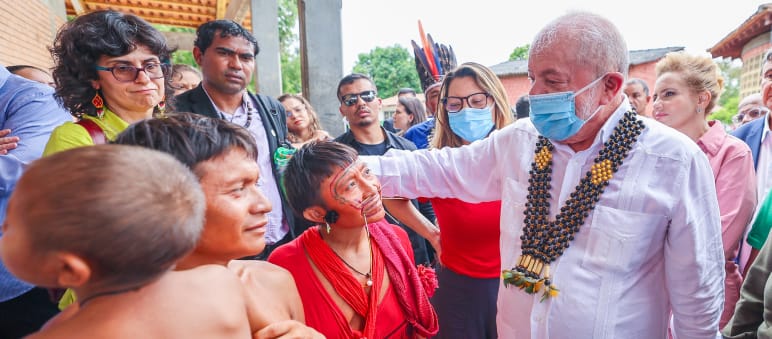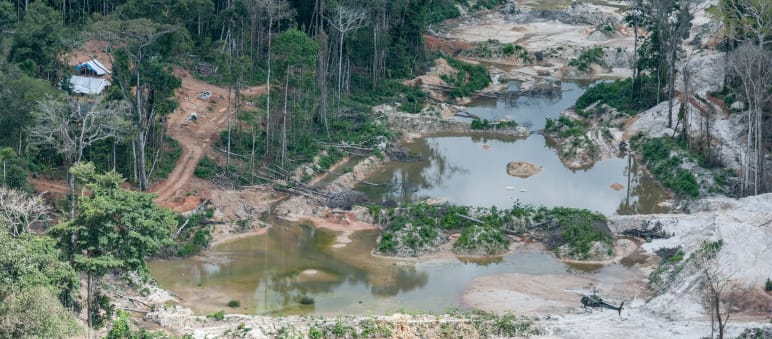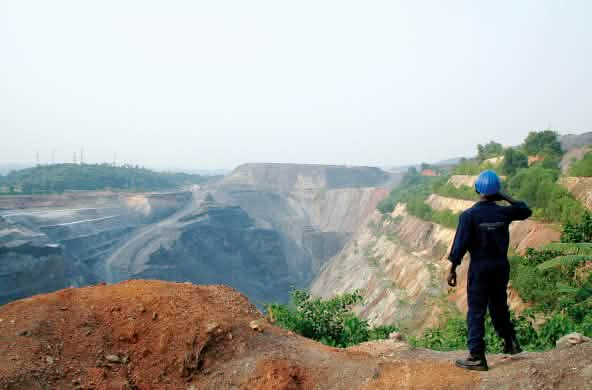Brazil: genocide of the Yanomami people uncovered
Shocking images and reports from the Yanomami rainforest are making news: In recent years, thousands of illegal gold miners descended on and occupied the Yanomami people’s state-recognized territory in the Amazon rainforest, polluting the environment and destroying the indigenous people’s livelihoods. The Yanomami are dying of introduced diseases, mercury poisoning and starvation.
The images and TV reports show a humanitarian disaster among the approximately 26,000 Yanomami living in northern Brazil: Children with bellies bloated by malnutrition and parasites, people emaciated to the bone; sick and apathetic people who no longer have the strength to go on.
“It looks like a concentration camp”, said Indigenous Health Secretary Weibe Tapeba in a radio interview. Tapeba called on Brazil’s military to evict illegal gold miners who have caused malnutrition and starvation in the Yanomami’s territory near the Venezuelan border.
Tens of thousands of armed gold miners invaded the Yanomami rainforest, bringing with them Covid-19 and other diseases, violence, lawlessness, prostitution, alcohol and drugs. The miners illegally built camps, roads, airstrips, bars and brothels.
The miners devastated the rainforest and especially the rivers, cutting down trees, churning and washing out the soils and river sediments with dredges and with jets of water from heavy pumps. The livelihoods of the Yanomami were destroyed and the people poisoned.
In addition to gold, the illegal prospectors are targeting other valuable mineral resources such as cassiterite, from which tin is extracted, according to Reporter Brasil and O Globo. The silvery-white metal is mainly used in solder, for tinplate products such as food cans, and for chemicals and pigments. Tin is worth around $28,000 per ton on the international market.
The photos cannot show the greatest threat: the mercury that is polluting the soils and waters. The miners use the toxic heavy metal to bind the washed-out gold dust. The Yanomami who drink the water, fish in the contaminated rivers, or farm the land cannot avoid being poisoned.
New Brazilian government intervenes
The Yanomami have been pointing out the catastrophic situation for years, but their appeals to Brazilian authorities and the previous government fell on deaf ears. Finally, on January 20, 2023, the new Brazilian government declared a health emergency for the Yanomami territory in the Amazon rainforest.
State forces are now transporting sick and starving Yanomami to health facilities and dropping food packages from helicopters. Special police and military units have begun to round up and expel the intruders. Excavators, pumping equipment and an airplane were destroyed. An important question is where the miners will move to now.
Lula da Silva and Sônia Guajajara visit Boa Vista
“Adults who weigh as much as children, children dying of malnutrition, malaria, diarrhea and other diseases”, observed Brazilian President Lula da Silva, while visiting a makeshift health center in Boa Vista in the state of Roraima, north of the Amazon, together with the Minister of Indigenous Peoples, Sônia Guajajara.
“More than a humanitarian crisis, what I saw in Roraima was genocide, a premeditated crime against the Yanomami, committed by a government that had no sense of suffering,” continued Lula, who took over the presidency from his predecessor Jair Bolsonaro in January 2023. 570 Yanomami children are reported to have died during Bolsonaro’s time in office.
Ex-President Bolsonaro promoted illegal mining
The former government of Bolsonaro and that of his predecessor Michel Temer not only ignored the appeals for help from the Yanomami and orders of the highest court: Funds and resources earmarked for indigenous peoples were diverted, and the indigenous agency FUNAI and environmental agency IBAMA were starved of funding and personnel.
In Bolsonaro’s view, Brazil had set aside too much land for a few Indigenous people, and their rainforest territories were rich in timber and mineral resources to be exploited. To this end, he wanted to legalize wildcat mining (garimpo in Portuguese) in the territories. Bolsonaro openly called for the occupation and plunder of the Indigenous peoples’ state-recognized and protected territories. Brazil’s highest court has now ordered federal prosecutors to investigate Bolsonaro and his government for genocide and other crimes against the Yanomami.
Rainforest Rescue project among the Tukano people
Rainforest Rescue, through the Instituto Nova Era, supports the indigenous Tukano people who live west of the Yanomami in their state-recognized territory, TI Balaio, in the state of Amazonas. The food supply situation for the people in the rainforest on the Rio Negro is poor. A project originally started for the cultivation of medicinal plants and the use of natural medicine was changed to the cultivation of food at the urgent request of the Tukano. In the remote area, the people have to provide for themselves first and foremost.


